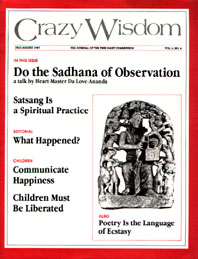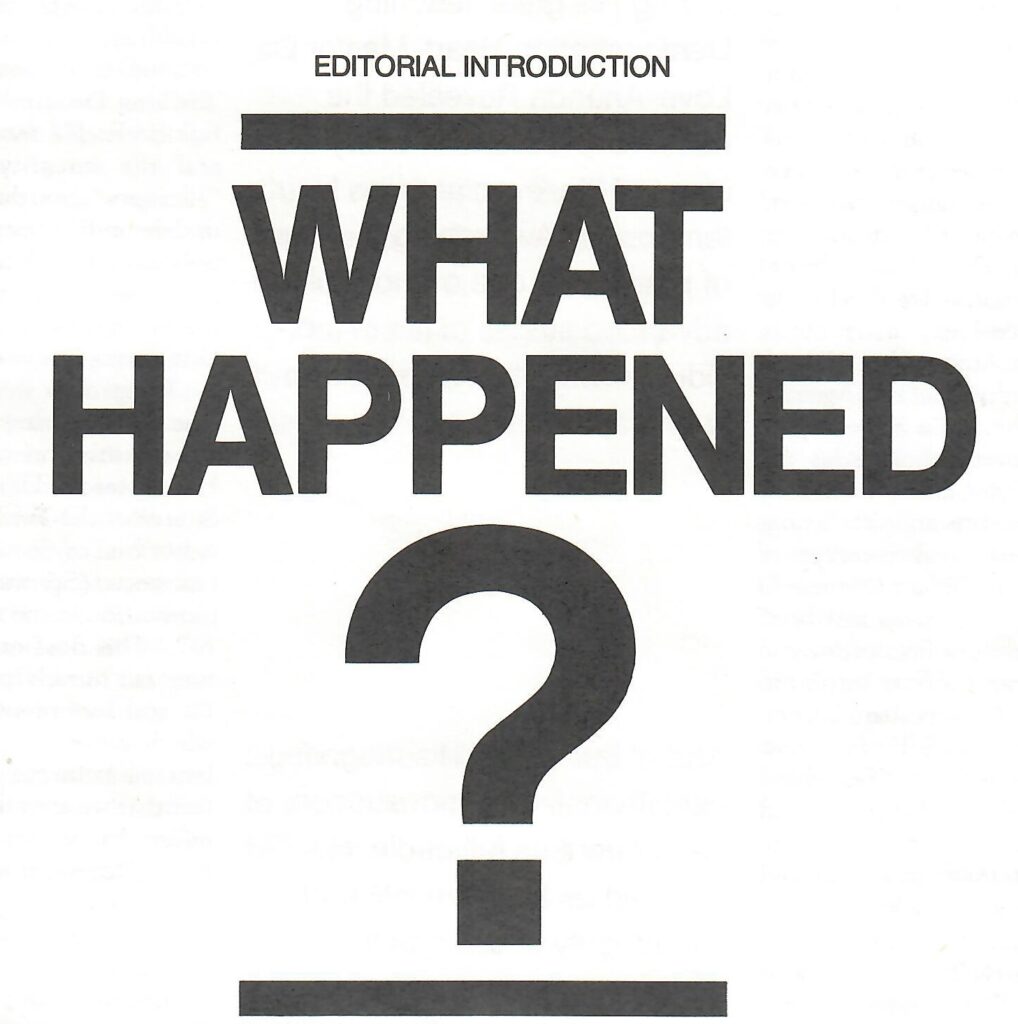The following is a 2022 review of a 1987 ‘Crazy Wisdom’ editorial entitled,

Crazy Wisdom
July/August 1987, Vol 6, NO 4

The One Great Teaching Demonstration
The practice of Satsang, (is) presumed to be the focus of (devotees) lives. As leaders of the culture, we were concerned with helping those in practicing stage one pass through the crisis of “hearing” and make the transition into the devotional culture.
As I write this…there are no “devotees” (or those who have “heard” Heart-Master Da’s Teaching Word and “seen” the Revelation of the Divine Person), and likewise, no devotional culture, no meditators, no morning and evening Guru Puja. Though we still serve one another and operate community schools and businesses, there is no true cooperative community to consider embracing more fully. Since none of us can rightly presume a Spiritual relationship with Heart-Master Da Love-Ananda, there are no devotees living in Satsang and no practitioners of Ishta-Guru-Bhakti Yoga. Moreover, whether anyone has fundamentally heard Heart-Master Da’s Teaching Word remains an open question. In any case, the great majority of those in The Free Daist Communion are “listeners”, involved in the process of study and pondering that leads to “hearing”. We are related to Heart-Master Da as Teacher. He has even restored the possibility of addressing Him once again as Avadhoota Da Free John, the (now retired) Teacher.
What happened?
The most striking of the recent events is the clarification of our relationship to Heart-Master Da Love-Ananda as the Source of the Teaching-Revelation, which is not one of Satsang in its fullest, Spiritual sense. (See the summary of His communication in the article “Satsang” on pp. 6-7.) This does not mean that we should now cut ourselves off from Heart-Master Da and suppress our love and gratitude, which are natural and appropriate in relationship to our Teacher. Nor does the fact that we are not Spiritual practitioners mean that we should deny our psychic feeling-connection to one another and to Heart-Master Da. The awakening to etheric energies and our psychic connectedness is appropriate and natural even to the second stage of life, and it is part of the ordinary process of human development that, in our materialistic society, most of us bypassed to one or another degree.
However, as Heart-Master Da has pointed out and as we have all begun to see, we have made real errors in our participation in the Way of the Heart and in our relationship to Heart-Master Da. These errors, which remain for us to understand and transcend, can be described generally as cultic religiosity and religious idealism.
Cultic Religiosity and Religious Idealism
Cultic religiosity is the “big toe” school of non-practice, named after those who hope to Realize God by childishly hanging on to the big toe of the True Heart-Master. In our egoity, we can all confess an unfortunate sympathy for this disposition. I am certain we have all many times heard, and perhaps even made, statements like: “He’s going to draw us through, if we just stay with Him.” This intention to persist in relationship to the True Heart-Master, come what may, might be admirable—if it weren’t grounded on the flimsy foundation of childish cultism. Our responsibility for Spiritual practice requires a great deal more than such hopeful clinging to Heart-Master Da. In our childish religiosity we want to be made magically free of the fear of death and the weight of responsibility for our actions (especially the root action that is Narcissus!). We want to be consoled, not Realized.
It is true that the process of Realization is founded on the most one-pointed relationship to the True Heart-Master, even to the point of Identification with His Samadhi. But, this process and this relationship cannot be presumed idealistically. In our cultic desire to be consoled, we try to feel good about ourselves and our circumstances through the process of self-glorifying egoic identification with the True Heart-Master and the Way of the Heart, instead of yielding ourselves through the self-transcending process of self-understanding and Spiritual surrender. This kind of false devotionalism amounts to a childish refusal of responsibility and a hope that the True Heart-Master’s very real Sacrifice will somehow substitute for our necessity to understand and transcend ourselves. The conventional religious idea of God as Father springs from this motive toward salvation by mere association, expressed as the hope that “He is running my life, so it is all going to work out”.
This same cultic religiosity has been the single most damaging attitude pervading our public work and our relations with family and friends not practicing the Way of the Heart. We have been given great wealth in the form of the Teaching Word and Heart-Master Da’s Demonstration of the lessons that prepare individuals for practice of the Way of the Heart. But we have consoled ourselves by feeling superior through mere association with this Gift, rather than truly receiving it and passing it on. This underlying superior attitude, betraying our childish need and our lack of self-understanding, has offended and excluded those we might have served. Also, in talking with people who have never seen Heart-Master Da and have studied only a little of His Wisdom-Teaching, we have chronically made them feel as if they must relate to Heart-Master Da devotionally, bypassing the necessary self-understanding that leads to hearing, then seeing, then acknowledgement of the Teacher as True Heart-Master. In this way we have denied the Wisdom-Teaching to those unwilling to assume a false (and thus cultic) devotionalism.
Such cultic religiosity amounts to a childish refusal of responsibility, and beyond that we suffer another false view toward responsibility that springs from religious idealism—the notion that Spiritual practice is about making our lives conform to an idealized picture of how a devotee’s life should look. Under the influence of an idealistic view of Spiritual life, we try to always feel and act as if we are experiencing what we feel only in some, even rare, moments. Thus, we manipulate ourselves to create “spiritual” experiences and emotional “highs”. Or we confuse conventionally balanced patterns of behavior and an orderly life with Spiritual practice, and we allow ourselves to feel and act only within a small band of the spectrum of possibilities. We sit on life, so it won’t blow our cover, revealing us to be beings bound by desire, and thus false renunciates. We turn Spiritual practice into a goal-oriented process or futile game of seeking Realization by means of self-suppressive behavior modification.
The process of listening requires the real freedom to experiment with our lives, to discover and understand and transcend our own self-limits. In order to make Heart-Master Da’s Teaching Argument real, each of us must fully identify the unique expression of Narcissus in our own life and thereby come to the most fundamental understanding of and responsibility for the activity of self-contraction. Heart-Master Da has recently described the freedom that is necessary for any real consideration of the Teaching Argument to come to a resolution:
During the years of my Teaching Work, you did whatever you pleased, seeing yourselves in the context of the Teaching Argument and the Spiritual Process. What was necessary for you was not behavioral control, but for you to see the results of your actions, the results and implications of your motives and your mind forms, see everything you are all about altogether. The Way of the Heart begins and always continues in Freedom. This Way begins with a process of confrontation with yourself, wherein you are simply being whatever the hell you are. People must be free to work out their lives, and when they have come to a resolution in themselves, then they enter the advanced stages of practice.
On the other hand, the sadhana of listening is not a matter of forever doing whatever you please. But freedom must be your operating principle. Eventually, if you enter the process on the basis of real consideration, you will generate a resolution. That is what you must do as you move through the stages. (April 3, 1987)
One of the lessons of this time is that, while the Way of the Heart is about freedom and self-understanding rather than behavioral perfection, we have suppressed in ourselves any behavior that has not been within a certain norm. Because we idealize certain behaviors and character types, we righteously judge all who fall outside these ideals, and we soon come to view a person’s stage of practice as a sign of his or her worth. In this manner, we transform the stages of practice into levels of status and conformity to social expectations. We trade the process of actual Realization for social face, so that the process of transition between levels of practice becomes degraded by games of power, prestige, and oedipally-based seeking for the presumed favor of the Guru. This combination of games and heresies creates the insider/outsider rift that has long plagued the politics of our gathering, undermining our capacity to trust one another and to be trustworthy.
We must also ask ourselves whether or not we ever finally come to terms with the vicissitudes of existence, or even can do so, ultimately. Is coming to terms with the vicissitudes of existence even what practice in the Way of the Heart is about? We are in conflict with ourselves, driven by opposing motives that cannot be resolved in life. We cannot willfully change ourselves, but we can understand and transcend ourselves. The “self” who would be cultically “saved” and consoled, or idealistically successful through suppression and self-effort, can only be understood and transcended—or else suffered. The only way not to repeat the past is to understand ourselves. As a gathering, we have tried everything else. The events of this time, when we have been ripped off from false relationship, false status, false practices, and false selfimages, have allowed us to see ourselves more clearly. What we will do now is up to us.
Contrast our fearful search for security and consolation, and our idealistic confusion of practice with suppressive selfeffort, founded on self-conflict, with Heart-Master Da’s confession of freedom and true responsibility from The Knee of Listening:
Understanding is the ground of this moment, this event. Therefore, enjoy it, for you alone are the one who must live your ends and all the stages of time. The man who understands, who is always already free, is never touched by the divisions of the mind. And he alone is standing when all other beings and things have gone to rise or fall. (p. 226)
The Biggest Lesson
In the past, probably everyone who read Heart-Master Da’s description of true hearing, not only in The Dawn Horse Testament but throughout the literature, has had a similar thought: “If these criteria were applied stringently, we would all need to re-examine our stage of practice.” Well, we were right. So why did we not re-evaluate ourselves sooner? There are many conceivable reasons: social pressure to conform, the need for acceptance and social face, valuing status over integrity, etc. But the simplest and most straightforward reason, and the biggest lesson of this time, is that we did not really listen to the Teaching Word. That is why we are all listeners now, and that is why we have not yet heard.
We must be real about the habits and character weaknesses that obstruct our understanding, and we must allow ourselves the freedom to go through whatever is necessary to deepen our self-understanding. We need to grow as human beings in the first three stages of life. But we must also transcend all of that, ultimately, and even presently. Cultic religiosity and religious idealism, and any other patterns of un-Happiness we feel the need to weed from our lives, grow from seeds of the self-contraction, which only Radical Understanding has the power to
uproot.
After all these years, we have some fundamental questions to ask ourselves. And, as always, Heart-Master Da has provided all the Help we need. ■
1987 Original Editorial